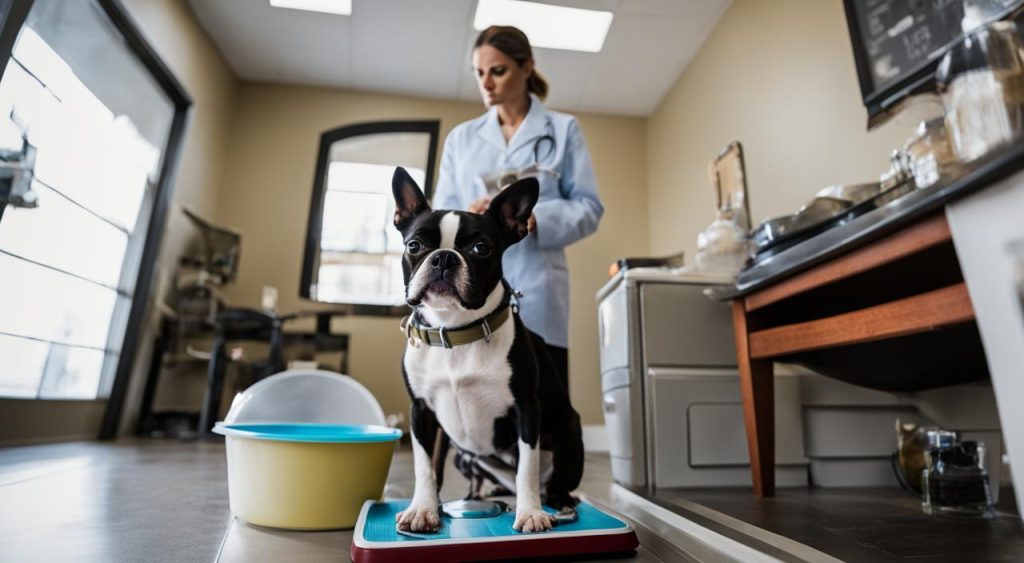Boston Terriers are known for their adorable and expressive faces, which may lead you to wonder if they cry a lot. While dogs cannot cry in the same way humans do, Boston Terriers may shed tears due to certain eye conditions. It’s important to understand these conditions and the emotions behind your Boston Terrier’s crying to ensure their well-being.
Boston Terriers are prone to eye problems, such as excess tearing or watery eyes, due to their breeding. This condition, called epiphora, is a sign that there may be an issue with their eyes, rather than a result of emotional distress. Common eye problems in Boston Terriers include corneal ulcerations, cherry eyes, cataracts, and conjunctivitis. Monitoring your dog’s eye condition and seeking veterinary guidance when necessary is crucial for maintaining their eye health.
While Boston Terriers may shed tears, they may also cry or whine to communicate their needs or emotions. Some common reasons for crying in Boston Terriers include hunger, excitement, pain, separation anxiety, or the desire to play. Understanding the underlying cause of their crying is important for addressing it effectively.
Key Takeaways:
- Boston Terriers may shed tears, but it’s due to eye problems rather than emotional crying.
- Common eye problems in Boston Terriers include corneal ulcerations, cherry eyes, cataracts, and conjunctivitis.
- Boston Terriers may cry or whine to communicate their needs or emotions.
- Common reasons for crying in Boston Terriers include hunger, excitement, pain, separation anxiety, or the desire to play.
- Understanding the cause of their crying is crucial for addressing it effectively.
Common Reasons for Boston Terriers Crying
Boston Terriers, like any other dogs, communicate through various vocalizations, including crying or whining. Understanding the common reasons behind your Boston Terrier’s crying can help you manage and address this behavior effectively.
Hunger is one of the primary reasons why Boston Terriers cry. Just like humans, dogs need regular meals to stay energized and satisfied. Ensuring that your furry companion is fed on a proper schedule with appropriate portion sizes can help alleviate their hunger-related crying.
Excitement can also trigger crying in Boston Terriers. Whether it’s the anticipation of going for a walk, seeing their favorite toy, or meeting new people, their excitement can manifest as cries or whines. Engaging in regular playtime activities and giving your dog outlets for their energy can help manage their excitement and reduce excessive crying.
Pain can be another cause for your Boston Terrier’s crying. Dogs may cry to communicate discomfort or injury. If you suspect that your dog is in pain, it is crucial to consult with a veterinarian to identify and address the underlying issue.
Separation anxiety is a common reason why Boston Terriers cry when left alone. Dogs are social animals and can experience distress when separated from their owners. Gradual desensitization to being alone, providing interactive toys, and creating a soothing environment can help ease separation anxiety and minimize crying.
Lastly, Boston Terriers may cry to seek attention or playtime with their owners. If you consistently respond to their cries by giving them attention or engaging in play, it can reinforce the crying behavior. It is important to strike a balance between meeting your dog’s needs and not reinforcing the crying behavior. Encouraging calm behavior and providing appropriate mental stimulation can help manage and reduce excessive crying.
By understanding the common reasons behind Boston Terriers crying and addressing them appropriately, you can create a harmonious and happier environment for both you and your furry companion.
How to Address Boston Terriers’ Crying
If your Boston Terrier is crying excessively, there are several steps you can take to address this behavior. First, it is important to identify the underlying cause of the crying.
If the crying is due to hunger, ensure that the dog is being fed regular meals and provide appropriate portion sizes. By meeting their nutritional needs, you can help alleviate hunger-related crying.
If the crying is a result of separation anxiety, gradually acclimating the dog to being alone can make a difference. Start by leaving them alone for short periods and gradually increase the duration. Additionally, providing them with toys or puzzles to keep them occupied can provide a sense of comfort and distraction.
To manage excessive crying, it is crucial to reinforce calm behavior. Avoid giving in to the dog’s demands when they cry, as this can inadvertently reinforce the behavior. Instead, reward and praise them when they exhibit calm and quiet behavior.
Consistency in training and providing a structured routine can also help reduce excessive crying in Boston Terriers. Dogs thrive on predictability, so establishing a regular feeding, exercise, and sleep schedule can help create a sense of security and stability for your furry friend.
Conclusion
Understanding Boston Terrier emotions is crucial in addressing their crying behavior. Excessive crying may indicate an underlying issue that requires attention. Regular vet examinations and prompt treatment of eye problems and health issues can help reduce crying episodes. Providing your Boston Terrier with adequate exercise, mental stimulation, and a calm environment can also contribute to managing and minimizing crying behavior.
Consistent training techniques, such as positive reinforcement, can be effective in addressing excessive crying. It is important to avoid reinforcing the crying by not giving in to demands. By understanding your Boston Terrier’s emotions and needs, you can establish a healthier relationship with your furry friend.
Remember, Boston Terrier vocalization and crying are natural ways for them to communicate their needs and emotions. However, if the crying becomes excessive, it is important to take proactive steps to identify and address the underlying cause. By following these tips and techniques, you can help your Boston Terrier have a happier and more contented life.





